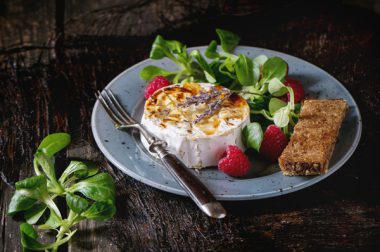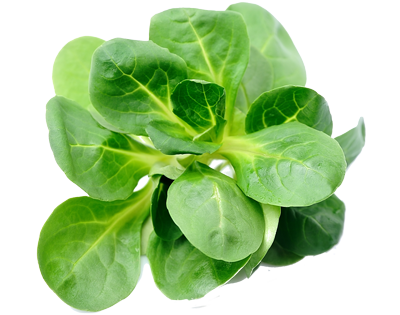Recipes we love
See all recipesLamb’s lettuce salad with apricots
A champion of a salad for vitamins! Together the lamb’s lettuce, watercress and lettuce cover your n...
Lambs lettuce salad with Jerusalem artichokes
This tasty, vitamin-packed lambs lettuce starter provides rare and valuable nutrients, making it a g...
Lamb’s lettuce salad with warm clams
A starter that’s full of flavour and packed with rare and precious micronutrients. The nutritional d...
Health
benefits
Lamb’s lettuce for looking well!
Lamb’s lettuce is rich in beta-carotene, an antioxidant that turns into vitamin A in the body. This vitamin plays a role in iron metabolism, immune system health, growth, eyesight, and good skin health.
Lamb’s lettuce is also:
- a source of vitamin B9 (for cellular renewal, particularly important for pregnant women for fetal development, for growing children, and for convalescents).
- a source of potassium (for the nervous system, muscular function, and blood pressure)
It also contains:
- calcium
- magnesium
- iron
- phosphorus
Nutritional
composition
When is the right
time to eat it?
In winter.
Lamb’s lettuce is available year-round, but its high season is in winter, extending from October to April.
Vegetable patch or
urban balcony?
Lamb’s lettuce is an annual that grows well in cool, shallow soil with some clay content, in partial sun. A temperate climate provides good conditions for growing lamb’s lettuce with beautiful green leaves.
To learn everything you need to know about growing lamb’s lettuce, read the page on growing advice.
Choosing and
storing lamb’s lettuce
Choose your lamb’s lettuce well:
- Leaves should be green, not wilted, and should not have yellow spots.
- Lamb’s lettuce bouquets should be generous.
Properly store your lamb’s lettuce:
In the refrigerator: in its original packaging, it can keep three to four days in the vegetable drawer.
Tips and
tricks
How to prepare lamb’s lettuce
Wash it under a gentle stream of cold water to avoid damaging it, making sure to remove all soil. Inspect the bouquets of lamb’s lettuce and remove the roots. Add dressing at the last minute.
Lamb’s lettuce goes well with…
Raw: Lamb’s lettuce is delicious in its simplest form, with a light vinaigrette to avoid overpowering its delicate taste. It goes wonderfully with carrots, red beets, hardboiled eggs, tomatoes, dried fruit, and dried duck breast. It also pairs well with seafood (scallops), fish, and almost all cheeses!
Cooked: Lamb’s lettuce does not fare well when cooked, but can nonetheless be sautéed in a fat for a few minutes or steamed for five minutes before being mixed with a cream to make a coulis to go with fish, for example. It is also delicious in a blended soup and can even be fried for a few seconds.
Can everyone
eat it?

Young children
It is not advisable to feed children lamb’s lettuce before age 24 months, except in cooked form, mixed in a potato puree or in the form of a blended soup.
And everyone else
Lamb’s lettuce has a subtle, refined hazelnut flavor that will please the palates of almost everybody.
See plenty of other tips for encouraging children to eat vegetables
Where does it come from?
Origins and varieties
Origins: France and the Netherlands are the main lamb’s lettuce producers.
Varieties: Lamb’s lettuce is dull green and velvety and grows in rosettes. Cultivated lamb’s lettuce is a Valerianella locusta var. olitoria, from the valerian family.
There are two main varieties:
- The coquille, with pretty green, round leaves.
- The blonde, with light green, longer, somewhat spoon-shaped leaves.



 Purslane
Purslane  Artichoke
Artichoke  Vegetable garden: growing yam
Vegetable garden: growing yam 











